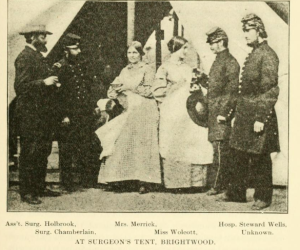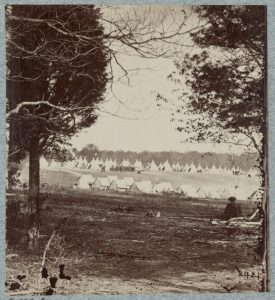Research Arsenal Spotlight 10: Edward Horatio Graves and the 10th Massachusetts Infantry
Edward Horatio Graves was born in Easthampton, Massachusetts in 1839, the son of Horatio Nelson Graves and Martha (Arms) Graves. His father died in 1852. The Research Arsenal collection contains 24 letters pertaining to Edward Horatio Graves. 9 were written by Edward Horatio Graves to his mother, and the remaining 15 were received by Graves from his family and friends. The letters begin in 1857 and end in June 1864.
Edward Horatio Graves enlisted in the 10th Massachusetts Infantry on June 21, 1861. He served as quartermaster sergeant before being commissioned as a lieutenant in 1863. He corresponded frequently with his mother, Martha (Arms) Graves, his siblings, and with a few different women friends.
Enlisting in the 10th Massachusetts Infantry
Edward Horatio Graves’ first letter to his mother was written on June 26, 1861. In it he describes his arrival at his regiment’s camp and the less-than-stellar accommodations they were provided, though his spirits were still high:
“We arrived here Sunday noon and marched immediately to Hampden Park where we have remained ever since. As soon as we arrived we commenced making preparations to sleep and get some straw and placed in our Bunks. I am now quartered in what used to be the Barn occupied by the horses at Horse Shows.”
The enlistment ceremony also saw some excitement, with several volunteers getting cold feet and being dealt with in a harsh manner:
“When we were sworn in we being the right were sworn in first and the N. Adams Company when their turn came to be sworn in some fifteen backed out and you ought to have seen the rest of the Co. take those poor men and strip their uniform off and drum them out with scarcely no clothing at all on and one man a kind of ring leader they shaved half his hair and whiskers off and then drummed him out without any hat. I felt sorry for him but he ought not to have volunteered his services.”
In the fall of 1861, the 10th Massachusetts Infantry was stationed at Brightwood in Washington, D.C. The regiment saw many of its members suffering from fever, and two women came to them from Massachusetts to aid in the hospital as nurses.
One of the women, a widow by the name of Anne Sophia (Clapp) Merrick, seems to have been known by Edward Horatio Graves, and is mentioned by him in a letter to his mother written on October 22, 1861, but the exact nature of their relationship was never revealed. Martha (Arms) Graves does refer to a “Mr. Bigheaded Clapp” in one of her letters, which is likely some relative of Anne Sophia (Clapp) Merrick. Mrs. Merrick was held in much higher esteem than her male relative:
“Mrs. Merrick is very much liked and I believe she is pleased with her position. I have not as yet claimed any relationship and shall not until I am placed under her charge which I trust I shall never be. I have been unusually healthy but we have been quite sickly here having had the Typhoid fever and about ten have died.”

Edward Horatio Graves in 1862
In August of 1862, the 10th Massachusetts Infantry was stationed at Harrison’s Landing, where Edward Horatio Graves wrote to his mother about some recent excitement in an August 3rd letter:
“We were aroused the other night about 12:00 by a furious cannonading coming from the River and the next morning I found upon enquiring down by the wharf that the Rebels had erected several batteries across the James River for the purpose of destroying the transports in the stream but the Capts of the transports had presence of mind enough to raise their lanterns to the top of their masts and thus deranged their fire and their shots went over some of them falling into the camp and doing some damage. Killed 8 or 10 men and several horses. Our heavy siege guns soon silenced them and yesterday when our forces went over they found that the Rebs had skedaddled and left several of their artillery which proved that they were in a hurry. It created some excitement necessarily as we thought that it might be a blind to draw our attention while they attacked us in front. All our reconnaissances have failed to find the enemy in force yet and many are the conjectures as to where they have gone.”
By the end of the month, Edward Horatio Graves had fallen ill and wrote to his family from the hospital:
“My Dear Mother,
Your kind letter came duly to hand and found me flat upon my back.
I was brought here to this Hospital 4 days ago in an ambulance completely worn out with our retreat from Harrison’s Landing. We left Harrison’s L. on Friday and I was comparatively well when we started but was seized with a sudden faintness and was obliged to leave my horse and get into one of the Baggage wagons where I stayed until we got to Williamsburg.”
Battle of the Wilderness

By 1864, Edward Horatio Graves had been promoted to 1st lieutenant of company K. In May, 1864, the 10th Massachusetts Infantry fought in the Battle of the Wilderness and Edward Horatio Graves was seriously wounded.
Martha (Arms) Graves wrote to her son on May 31, 1864, after hearing that he had been wounded. Her letter reflects her strongly religious nature:
“I hope you are very thankful as we are that “that bullet” did not take life. It was sent by an unerring hand. There was no chance in the matter at all and now don’t forget that your spared life is a consecrated life from the first I have only asked your life that it might honor God. You have nobly honored him in serving your Country Suffering bleeding for Freedom the second best gift of God to man. We believe our nation will be justified by its own blood. Let us believe that the blood of Jesus Christ can purify us + that is the highest honor we can give to God.”
Edward Horatio Graves replied to his mother’s letter on June 2, and gave her a few further details on his health:
“You see that I am still here and I cannot see much improvement yet although I am now able to sit up 5 minutes to a time which will tend I think to strengthen me. I have strong notion of coming home as I am how would that do. I don’t suppose you could have two invalids in the home at the same time but I have got so tired and sick of the place that I think it hinders me from getting well as fast as I might. The Dr. told me this morning that he did not think it would harm me much to go.”
Despite his serious wound, Edward Horatio Graves eventually recovered and returned home. He passed away in 1880 at the age of 41. To read the full collection of letters, sign up for a Research Arsenal membership.
Learn about other collections in our spotlight such as James Webster Carr of the 2nd New Hampshire Infantry and Asa “Frank” Chester of the 20th Illinois Infantry.

